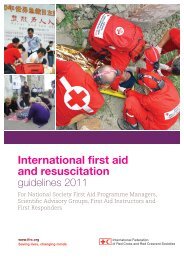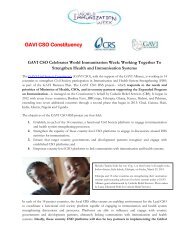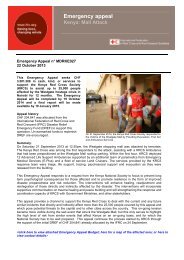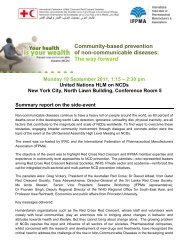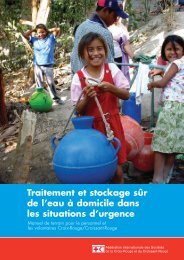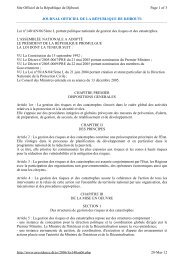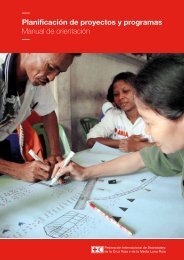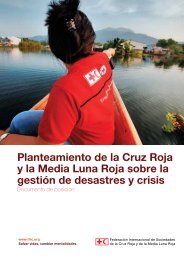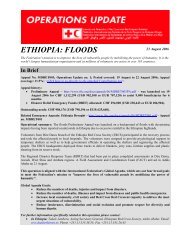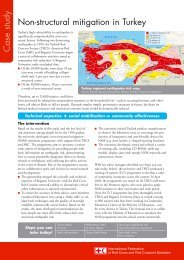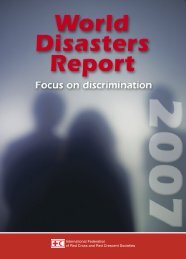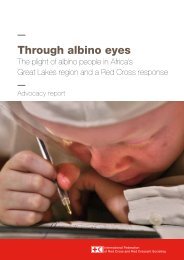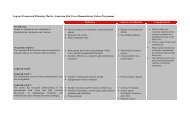World Disasters Report 2010 - International Federation of Red Cross ...
World Disasters Report 2010 - International Federation of Red Cross ...
World Disasters Report 2010 - International Federation of Red Cross ...
Create successful ePaper yourself
Turn your PDF publications into a flip-book with our unique Google optimized e-Paper software.
CHAPTER 5<br />
104<br />
people – two-fifths <strong>of</strong> the world’s population – are now at risk, according to WHO.<br />
The organization estimates that there may be as many as 50 million infections every year,<br />
with most going unreported. In the Americas there were more than 890,000 reported<br />
cases <strong>of</strong> dengue in 2007, <strong>of</strong> which 26,000 were <strong>of</strong> the <strong>of</strong>ten-fatal haemorrhagic fever type.<br />
Yet 50 years ago, the disease was virtually unknown. It first appeared in Manila in the<br />
Philippines in 1953 and had jumped to Bangkok, Thailand by the end <strong>of</strong> the decade.<br />
Before 1970, only nine countries had experienced epidemics <strong>of</strong> the severe haemorrhagic<br />
fever, which kills in almost 25 per cent <strong>of</strong> cases. By 1995, this number had risen<br />
to around 40. The disease is now endemic in more than 100 countries in Africa, the<br />
Americas, the eastern Mediterranean, South-East Asia and the western Pacific. Not<br />
only is the number <strong>of</strong> cases increasing, as the disease reaches new areas, but so too is the<br />
number <strong>of</strong> serious outbreaks. In 2007, Venezuela reported over 80,000 cases, including<br />
more than 6,000 cases <strong>of</strong> haemorrhagic fever.<br />
The disease is spread by the Aedes aegypti mosquito, which has come to thrive in tropical<br />
urban environments. It breeds in and around city homes, in ro<strong>of</strong> gutters, beneath<br />
refrigerators, under flowerpots and anywhere there is stagnant water, including in waste<br />
packaging and discarded food tins. Used tyres are a favourite breeding ground. With<br />
globalization, the mosquito also gets to travel easily. Dengue is thought to have arrived<br />
in Brazil, now one <strong>of</strong> the most affected countries, in the rims <strong>of</strong> tyres exported from Asia.<br />
Cities change us<br />
With 70 per cent <strong>of</strong> the global population forecast to be living in urban areas by 2050,<br />
the predominant lifestyle around the world will become increasingly an urban one. But<br />
what are the implications <strong>of</strong> an urban lifestyle for health? It is a mixed picture whereby<br />
many improvements in basic health indicators, such as infant and child mortality rates<br />
and life expectancy, have to be balanced against health threats which stem directly from<br />
urban living.<br />
The major risk factors for non-communicable disease are an unhealthy diet, lack <strong>of</strong><br />
exercise, smoking and excessive use <strong>of</strong> alcohol: all <strong>of</strong> them fostered one way or another<br />
by urban living.<br />
Perhaps the most visible and most health-threatening manifestation <strong>of</strong> the risk factors<br />
is obesity. Being significantly overweight greatly increases the chances <strong>of</strong> developing<br />
type 2 diabetes, heart and respiratory problems and even some forms <strong>of</strong> cancer.<br />
According to WHO, over 1.6 billion adults are overweight and nearly one in four is<br />
obese. By 2015, the figure for those overweight will have risen to 2.3 billion. As an<br />
example <strong>of</strong> the likely impact on health, WHO forecasts that the number <strong>of</strong> people<br />
with obesity-related diabetes will double to 300 million between 1998 and 2025 –<br />
with three-quarters <strong>of</strong> that growth projected in the developing world.



